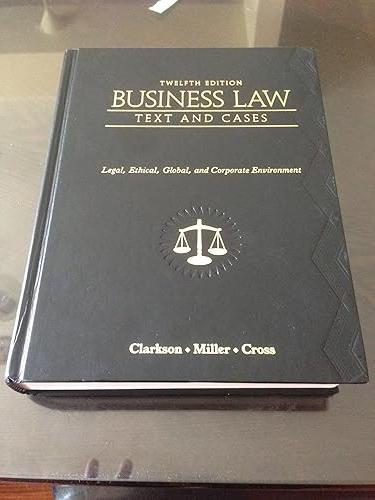The plaintiffs in this action bring claims under the Alien Tort Claims Act (ATCA) against approximately fifty
Question:
The plaintiffs in this action bring claims under the Alien Tort Claims Act (“ATCA”) against approximately fifty corporate defendants and hundreds of “corporate Does” [including Bank of America, N.A.; Barclay National Bank, Ltd.;
Citigroup, Inc.; Credit Suisse Group;
Deutsche Bank A.G.; General Electric Company; IBM Corporation;
and Shell Oil Company]. The plaintiffs argue that these defendants actively and willingly collaborated with the government of South Africa in maintaining a repressive, racially based system known as “apartheid,”
which restricted the majority black African population in all areas of life while providing benefits for the minority white population.
Three groups of plaintiffs fi led ten separate actions in multiple federal district courts asserting these apartheid-related claims. One group, the Khulumani Plaintiffs, fi led a complaint against twenty-three domestic and foreign corporations, charging them with various violations of international law. The other two groups, the Ntsebeza and Digwamaje Plaintiffs, brought class action claims on behalf of the
“victims of the apartheid related atrocities, human rights’ violations, crimes against humanity and unfair [and] discriminatory forced labor practices.”
* * * All of the actions [were transferred to a federal district court in] the Southern District of New York * * * . Thirty-one of the fifty-five defendants in the Ntsebeza and Digwamaje actions * * * [and] eighteen of the twenty-three defendants in [the Khulumani] action * * * filed * * * motion[s]to dismiss.
* * * *
Ruling on the defendants’ motions to dismiss, the district court held that the plaintiffs failed to establish subject matter jurisdiction under the ATCA. * * * The district court therefore dismissed the plaintiffs’ complaints in their entirety. * * * The plaintiffs fi led timely notices of appeal [with the U.S. Court of Appeals for the Second Circuit].
* * * *
* * * [This court] vacate[s] the district court’s dismissal of the plaintiffs’ ATCA claims because the district court erred in holding that aiding and abetting violations of customary international law cannot provide a basis for ATCA jurisdiction.
We hold that * * * a plaintiff may plead a theory of aiding and abetting liability under the ATCA. * * *
[The majority of the judges on the panel that heard this case agreed on the result but differed on the reasons, which were presented in two concurring opinions. One judge believed that liability on these facts is “well established in international law,” citing such examples as the Rome Statute of the International Criminal Court. Another judge stated that grounds existed in such resources of U.S. law as Section 876 (b) of the Restatement (Second) of Torts, under which liability could be assessed in part for “facilitating the commission of human rights violations by providing the principal tortfeasor with the tools, instrumentalities, or services to commit those violations.”] [Emphasis added.]
* * * *
* * * We decline to affirm the dismissal of plaintiffs’ ATCA claims on the basis of the prudential concernsa raised by the defendants.
* * * The Supreme Court [has]
identified two different respects in which courts should consider prudential concerns in deciding whether to hear claims brought under the ATCA.b First, * * * courts should consider prudential concerns in the context of determining whether to recognize a cause of action under the ATCA. Specifically, * * * the determination whether a norm is sufficiently definite to support a cause of action should (and, indeed, inevitably must) involve an element of judgment about the practical consequences of making that cause available to litigants in the federal courts. Second, * * *
in certain cases, other prudential principles might operate to limit the availability of relief in the federal courts for violations of customary international law.
* * * *
One such principle * * * [is] a policy of case-specific deference to the political branches [of the U.S. government]. This policy of judicial deference to the Executive Branch on questions of foreign policy has long been established under the prudential justiciability doctrine known as the political question doctrine. Another prudential doctrine that the defendants raise in this case is international comity. This doctrine * * * asks whether adjudication of the case by a United States court would offend amicable working relationships with a foreign country. [Emphasis added.]
* * * *
We decline to address these case specific prudential doctrines now and instead remand to the district court to allow it to engage in the first instance in the careful “case-by-case”
analysis that questions of this type require.
* * * *
* * * We VACATE the district court’s dismissal of the plaintiffs’ ATCA claims * * * and REMAND for further proceedings consistent with this opinion.
Questions:-
1. What are the ramifications for the defendants of the ruling in this case?
2. How might such “prudential concerns” as the principle of comity affect the eventual outcome?
Step by Step Answer:

Business Law Text And Cases Legal Ethical Global And Corporate Environment
ISBN: 9780538470827
12th Edition
Authors: Kenneth W. Clarkson, Roger LeRoy Miller, Frank B. Cross





